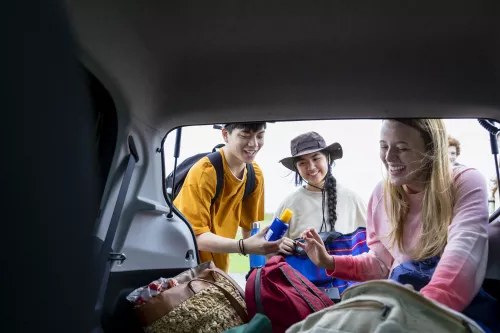
Get the facts about skin cancer
After a gray New England winter, it’s hard not to go out and grab every bit of sunshine. But before you venture outside, Tufts Medical Center dermatologist, Michelle Bichchau Nguyen, MD, MBA, MPH, FAAD, Director, Mohs Micrographic Surgery, is here to help you get smart about skin cancer.
Q: What is skin cancer?
A: Skin cancer is the most common type of cancer, but it’s also the one of the easiest to prevent and to treat when found early. Most skin cancer is caused by the ultraviolet (UV) rays from the sun, which damage the skin cells. The 3 most common types of skin cancer are:
- Basal cell carcinoma (BCC) is the most common type of skin cancer. Basal cell skin cancers usually start on sun-exposed areas like the face, scalp, chest and neck.
- Squamous cell carcinoma (SCC) is the second most common type of skin cancer. Like BCC, squamous cell skin cancers most often first appear on sun-exposed areas.
- Melanoma is the most aggressive and serious type of skin cancer. Melanoma can develop anywhere on the skin, but it is more likely to start in areas like the head, face and extremities.
Q: Who is at risk for skin cancer?
It’s important to understand that anyone of any skin color, race or ethnicity can develop skin cancer. In addition to age, factors that increase the risk of developing skin cancer include having:
- sunburns as a child or young adult
- skin that burns or freckles easily
- naturally red or blond hair
- irregular or large moles
- a family history of melanoma
- a history of indoor tanning
- precancerous skin spots
Q: What can we do to prevent skin cancer?
A: Just a few bad sunburns in childhood can greatly increase your chances of developing skin cancer as an adult. Because skin damage from UV rays can take many years to develop into skin cancer, it’s important to develop healthy sun safety habits at an early age and continue them throughout your life. Practicing sun safety is one of the most important things you can do to lower your risk of skin cancer. Everyone should:
- Limit sun exposure—especially between 10 am and 4 pm, when the sun’s rays are strongest.
- Wear a hat, sunglasses and clothing specifically designed for UV protection
- Use a broad-spectrum sunscreen with an SPF of at least 30 all year round and reapply it every 2 hours and after swimming
- Avoid tanning beds and sun lamps
Q: You mentioned early detection for skin cancer is key, what should people look for?
A: The best way to catch skin cancer early is to check your skin often for changes. People with one or more risk factors mentioned above should perform a self-exam each month. A new growth or spot or a change in the size, shape, or color of a mole can be a sign of cancer. We recommend the ABCDE rule to help you remember what to look for:
- A: Asymmetry in shape and appearance
- B: Border irregularities, like jagged or uneven edges
- C: Color variegation
- D: Diameter greater than 6 mm (larger than a pencil eraser)
- E: Evolution in color, shape or symptoms
Q: When should I see a doctor?
A: If you notice a new growth or a change in an existing growth or mole, make an appointment to see your doctor to have it tested right away. In addition to monthly skin checks, we recommend seeing your dermatologist each year for a full body exam.
Learn more about preventing and treating skin cancer + schedule a skin check